Fishkeeping requires optimal water conditions. Aquarists have always had a problematic relationship with hard water. Without even having solid proof, many species of fish cannot survive in hard aquarium water.
We cannot blame the conviction because hard water has caused numerous problems in households worldwide. Skin- and hair-related health issues and poor durability of home appliances are some of these problems. So, it’s not surprising to believe that aquarium fish might also have problems with it.
Here is the truth: you cannot judge how an aquarium deals with hard water without considering a few aspects. For instance, some aquarium fish species can easily survive in hard water, while others would not last even a day.
Therefore, before you think about how to soften your aquarium water for the fish’s sake, you should understand the real problem with hard water.
In this guide, we have explained the hard water issue and how it could impact the growth and sustenance of your aquarium.
Contents
Why Is Hard Water Problematic?
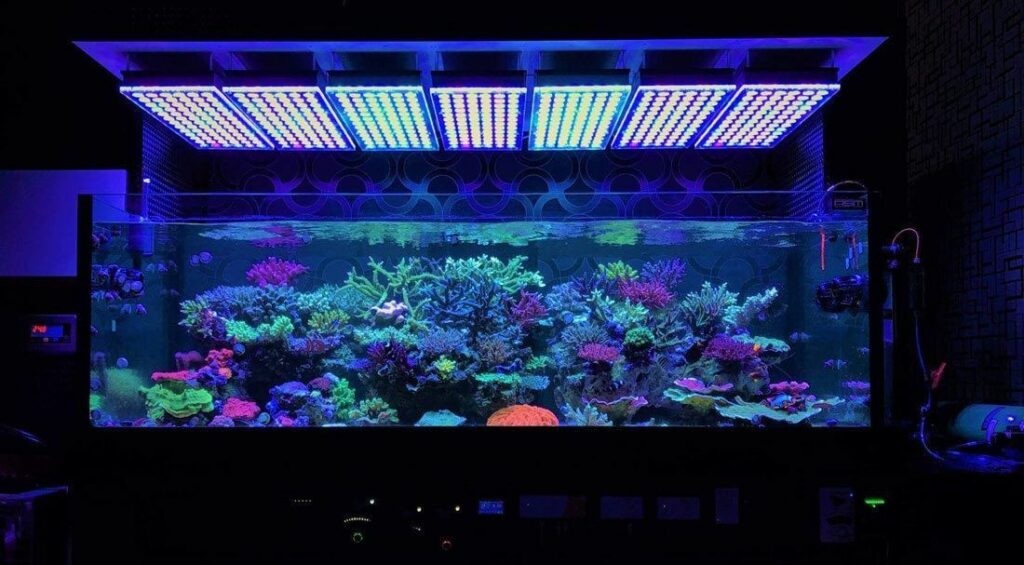
As we mentioned above, water hardness is discussed in multiple domains. People who own electric home appliances and aquarium owners are equally concerned about the hardness of the water they get.
If you are entirely new to the scene, water hardness is often described as the mineral levels in the water. Soft water has a low dissolved mineral content, whereas hard water has high mineral levels.
These dissolved minerals can impact how the water deals with various things, including organic bodies, electric appliances, metals, and cleaning solutions. For example, you may have difficulty using hard water to wash clothes.
Since the components in your aquarium come under the category of organic bodies, water hardness may affect the life and growth of fish, too. As you probably know, not all species of fish are great at adjusting to the changes in the environment.
So, you cannot expect a fish to live or grow in the best form if you put it in an aquarium with a non-optimal water hardness level.
Some species can deal with hard water, while others require soft, acidic water. Paradise fish, archers, and most livebearers (swordtails, mollies, guppies, and platies to name a few) are all hard water fish species. Tropical fish like tetras and South American cichlids, on the other hand, need a soft freshwater aquarium.
Here are some of the most significant problems that hard water can cause in your aquarium.
- As we said, some fish species cannot survive in hard water. If you have such fish in the aquarium, it means that you will soon see them dying. It happens because the high mineral levels may affect the fish’s essential organs.
- Even though hard water may not kill all fish species, it can stunt the growth of many. As one of the results, you may see the fish not achieving the optimal size or health. Although this situation may not lead to death, it is a serious problem.
- Hard water can also impact the aquatic plants’ sustenance and growth inside the tank. Even though the plant may get enough sunlight and nutrients, the bulkiness of minerals in the water could cause problems with its growth.
- The hardness of water also affects the pH level in your water tank. It means the water could be more acidic or alkaline. However, you will see some impact on the fish and other living beings inside the tank in both cases.
While these problems are legit, they don’t happen to every combination of hard aquarium water and fish species. As we said, you can avoid these issues by choosing a type of plant/fish that can survive in such water. Depending on the region you are from and your aquatic situation, these varieties will be different.
But how do you know if hard water is the reason for the death or stunted growth of organics in your tank? Well, science has got you covered.
How Is Water Hardness Measured?
There are two ways of measuring the hardness of water: General Hardness (GH) and Carbonate Hardness (KH). General Hardness measures calcium and magnesium ions in the water, whereas Carbonate Hardness (also known as alkalinity) measures carbonate and bicarbonate ions.
The hardness of aquarium water is referred to as a degree of hardness (dH) or as parts per million (ppm). When the dH is between 6 and 25 or the ppm is between 101 and 449, the water is considered to be slightly hard to hard. Lower numbers indicate that the water is soft or very soft.
Learn more from these related posts:
- How to Lower Aquarium GH (General Hardness)
- How to Raise & Lower KH (Carbonate Hardness) in Aquarium
- How to Cycle Your New Aquarium?
How to Determine Whether Your Aquarium Has Hard Water?
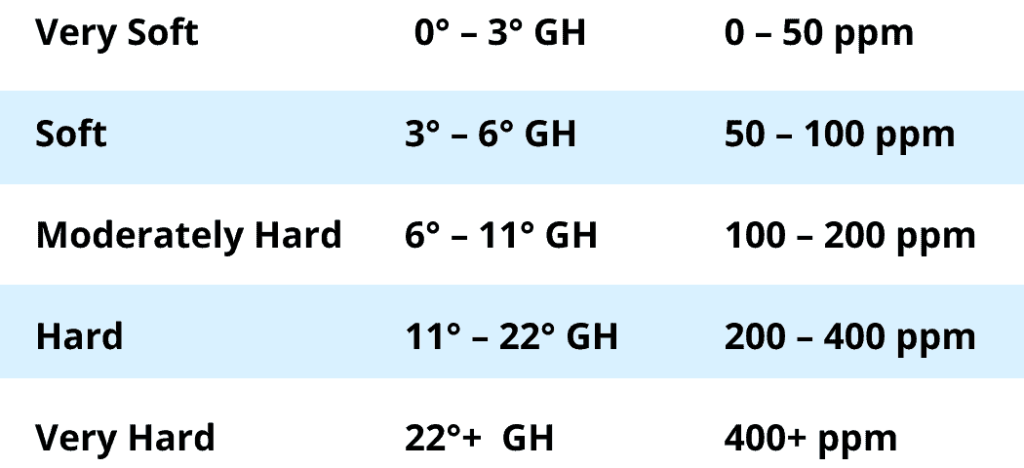
Depending on the area you live in, you can rely on a few methods to find out whether the water you have used in the tank is hard or soft. We have listed some of the standard techniques, and you can pick one depending on the number of details and the accuracy you expect from these reports.
- The best way to find out whether you have hard water in the aquarium is to get in touch with the city you live in. Most places can give you an accurate figure about the hardness of the water supplied via public systems. So, if you have used tap water to fill in the tank, you can instantly know if it’s hard or soft.
- If you use water from a private source, things could be different. Firstly, you can opt for a DIY testing situation. The best method is to check how the water deals with soap and the common types of detergent. If you cannot see a considerable number of bubbles in the solution, you can expect the water to be hard.
- The third option is to get an advanced water test kit. Instead of getting a kit specific to water hardness, you can get a full-fledged water quality/water chemistry test kit. You can find two types of kits: ones that you have to send to a lab and ones that give you instant results. You would know whether you have hard or soft water in a few days even with the first type.
These three methods are the best when you want to determine the hardness of the water you have used to fill the fish tank. You can also try some less scientific methods, such as looking at the impact the water has on metals and electric home appliances. But it always makes more sense to be accurate than sorry!
Softening Hard Aquarium Water
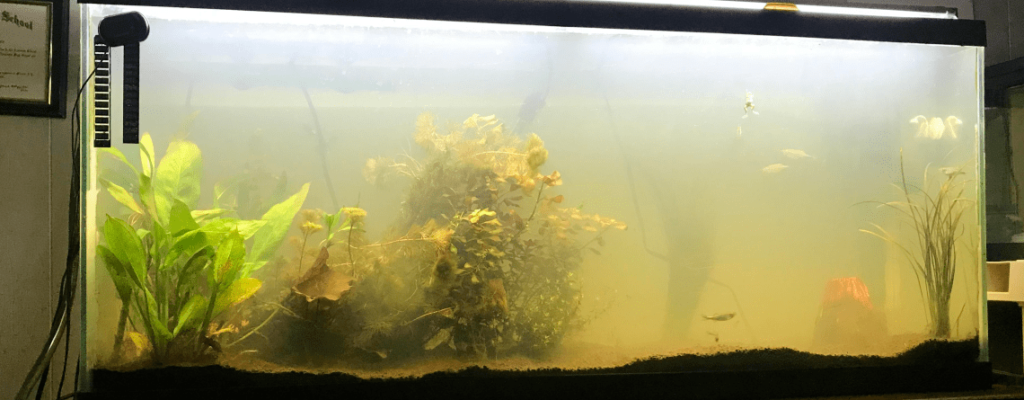
Let’s assume you have found out that the water in your aquarium is hard. The best step is to soften it so that the fish and plants in the tank don’t get affected. As you can probably guess, there are a few ways to achieve this goal. And we have listed some of the most effective ones below.
Peat Moss
If you want to soften your fish tank water without affecting the daily life of the fish, you can consider adding peat moss to it. You have to keep in mind that peat moss doesn’t work instantly. Instead, it can gradually reduce the number of minerals from the water.
Peat moss is one of the easiest and most effective options you can choose from. However, you cannot be sure about the accuracy aspect. If you take care of fish that are very sensitive to water hardness, this method may not give you the results you seek.
When it comes to applying this commonly used fish tank water softener, it’s best to add the peat to your aquarium filter or soak it in a clean and large container for a couple of weeks (boil it to ward off contaminants). You can find many high-quality non-additive peat moss options on Amazon.
Water Softening Pillows
Like the first option, water softening pillows are great for removing extra minerals from tank water. You can insert these pillows into the tank and remove them after some time.
During this time, the pillow will attract all the potentially dangerous minerals from the water, thereby making it soft. The limitation with water softener pillows is that they are costly. Depending on the water change frequency, you may need tens or hundreds of pillows per year.
One of the top water softener pillows on the market is API’s Aquarium Canister Filter Filtration Pouch. This chemical filter media reduces the general hardness present in tap water and removes heavy metals.
- Contains one (1) API WATER SOFTENER PILLOW Aquarium Canister Filter Filtration Pouch 1-Count Bag
- Softens hard water
- Reduces general hardness by lowering calcium and magnesium
Reverse Osmosis
Reverse Osmosis is probably the most scientific way to soften aquarium water without affecting the way your fish and plants live. Depending on the size and nature of the tank, you can choose one of the best RO techs for the aquarium.
In addition to helping you save money, Reverse Osmosis will also remove pollutants from the source water. If you didn’t know, the biggest industries in the world use Reverse Osmosis to soften water at their facilities.
Keep in mind that you might need to combine RO water with tap water to achieve the desired balance between softness and hardness.
Driftwood
Driftwood isn’t quite as effective as the previously mentioned solutions, but it’s still a good choice. It releases tannins and usually changes the tank water color into brown, but doesn’t harm the fish. It’s smart to buy driftwood from your local fish store.
Rainwater Harvesting
Suppose you can’t use the mineral-rich water from your public tap system or a private well. In that case, the best way to get soft water for your aquarium is rainwater harvesting. As you can expect, rainwater doesn’t contain the minerals that bother us in hard water.
So, if you can harvest this pure water during the rainy season, you can use the same for your aquarium. You can continually expand these plans if you want to get soft water for domestic purposes, but you would need a gigantic tank, among other things.
We have skipped some water-softening methods because they affect fish growth. Therefore, if you are looking for the most effective and safest ways to soften water, you should stick to the recommended ones above.
Conclusion
Even though it’s not the biggest problem aquarium hobbyists face, hard tank water can affect the growth of the fish. Conveniently, you can choose one of the best ways to determine the hardness of water and soften it if needed. We believe this guide helped you find a method suitable for your fish tank and the growing patterns of your fish.

Ian Sterling, founder of Fishlab.com, began his aquarium journey over 30 years ago, driven by a deep fascination for fish and their diverse personalities. His website, Fishlab.com, is dedicated to making fishkeeping accessible and enjoyable, offering beginner-friendly guidance, expert insights, and a community for aquarists to connect and share experiences.


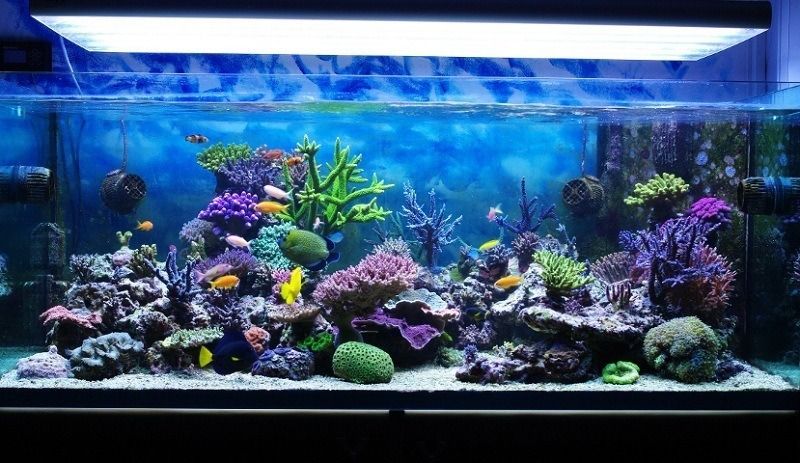
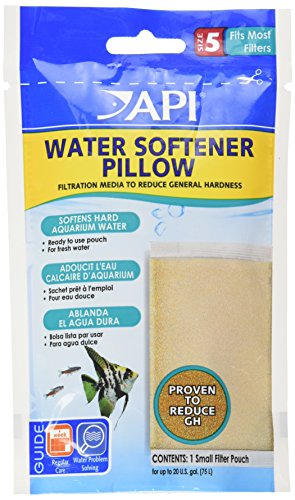
Comments (1)
I recently installed a water softener (sodium chloride) but only for hot water. I hope to mix cold and some hot water for my neon tetras to maintain 75 to 78 degrees during WC. Do you believe this small amount of sodium will be hurtful to the tetras? I tested the KH with the mix of cold/hot water at 6°dKH (107.4 ppm). Other websites say that’s too high and say it should be 2°. I’ll never get to 2°. Would love to hear your thoughts.